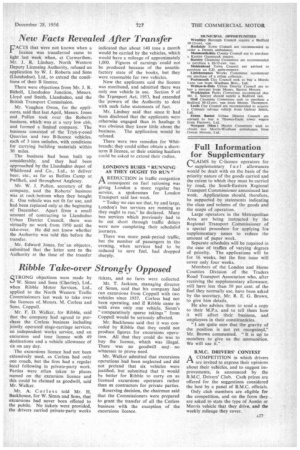New Facts Revealed After Transfer
Page 29

If you've noticed an error in this article please click here to report it so we can fix it.
FACTS that were not known when a licence was transferred came to light last week when, at Carmarthen, Mr. J. R, Lindsay, North Western Deputy Licensing Authority, refused an application by W. J. Roberts and Sons (Llandudno), Ltd., to extend the conditions of their B licence.
There were objections from Mr. J. R. Mull, Llandudno Junction, Messrs. Lloyd and Smith, Llandudno, and the British Transport Commission.
Mr. Vaughan Owen, for the applicants, said that last April, Messrs. Jones and Pullen took over the Roberts business, which was at a very low ebb, and formed a limited company. The business consisted of the Tryn-y-coed Quarries and two B-licence vehicles, each of 3 tons unladen, with conditions for carrying building materials within 30 miles.
The business had been built up considerably, and they had been approached by the Llandudno depot of Whitbread and Co., Ltd., to deliver beer, etc., as far as Butlins Camp at Pwllheli, and throughout Anglesey.
Mr. W. J. Pullen, secretary of the company, said the Roberts' business was at rock-bottom when they bought it. One vehicle was not fit for use, and had been replaced only at the beginning of December. Apart from a small amount of contracting to Llandudno Urban District Council, there was virtually no work from 1950 until the take-over. He did not know whether the Authority was told this before the transfer.
Mr. Edward Jones, for an objector, submitted that the letter sent to the Authority at the time of the transfer indicated that about 140 tons a month would be carried by the vehicles, which would have a mileage of approximately 1,000. Figures of earnings could not be produced because of the unsatisfactory state of the books, but they were reasonable for two vehicles.
Now the applicants said the licence was moribund, and admitted there was only one vehicle in use. Section 9 of the Transport Act, 1953, had extended the powers of the Authority to deal with such false statements of fact.
Mr. Lindsay said that since it had been disclosed that the applicants were otherwise engaged than in haulage it was obvious they knew little about the
business. The application would be refused.
There were two remedies for Whitbreads: they could either obtain a shortterm B licence, or their existing hauliers could be asked to extend their radius.
LONDON'S BUSES "RUNNING AS THEY OUGHT TO RUN"
A REDUCTION in traffic congestion rk consequent on fuel rationing was giving London a more regular bus service, a spokesman for London Transport said lastweek.
"Today we can see that, by and large, London's bus services arc running as they ought to run," he declared. Many bus services which previously had to be cut short through traffic delays were now completing their scheduled journeys.
There was more peak-period traffic, but the number of passengers in the evening, when services had to be reduced to save fuel, had dropped sharply.




















































































